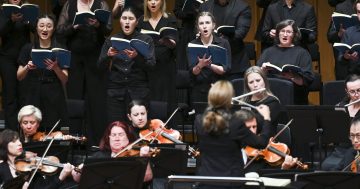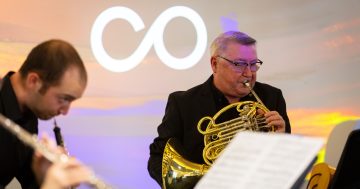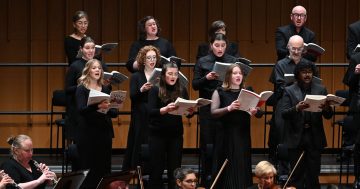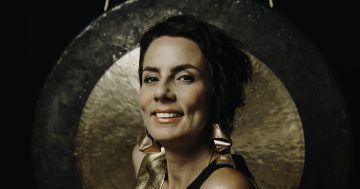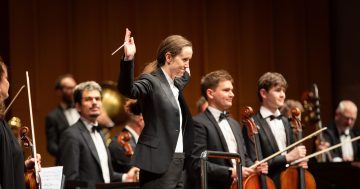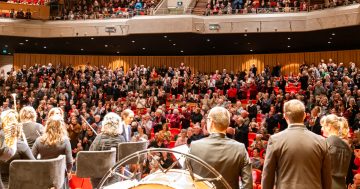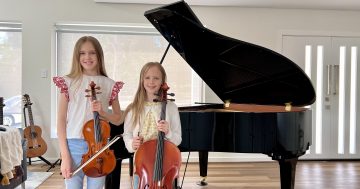
Cellist Umberto Clerici will feature in the final mainstage concert of the year for the Canberra Symphony Orchestra and in recital. Photo: Laura Stanca.
Bookending the last Llewellyn Hall concert of the year for the Canberra Symphony Orchestra are two symphonic blockbusters: Sibelius’s Finlandia and Tchaikovsky’s epic Symphony No 6.
But for a change of emotional pace in the middle, the CSO’s next Artist in Focus, Umberto Clerici, will feature in a performance of Elgar’s moving Cello Concerto, made famous by prodigy Jacqueline du Pré, whose career was cut short by multiple sclerosis.
For Italian Clerici, also in town for a recital on Sunday, playing a concerto by the most British of composers in an English-speaking country is like being a guest in someone else’s home, respectful but still being able to bring your own sensibility to the setting.
Nonetheless, his wife always says, “This is not your country, you have to behave”.
But it will be his interpretation, no matter how carefully he adheres to the text.
“The sensitivity of an artist anyway filters a piece so much, and because this piece is so personal for the composer and talks about his ideas, his ethic and life, of course, it gets very deep into the player,” Clerici says.
He says the drama of du Pré adds to the mythic quality of the piece she made so popular.
Clerici has performed the concerto many times, calling it a melancholic, achingly sad and nostalgic piece that reflects the state of Elgar, the last Victorian composer, late in life and his country when the Great War had shattered the illusion of empire.
He agrees the cello is the perfect vehicle such an exploration of the human and social condition.
“This is why I’m so passionate about [the cello], it not only touches all the human voice register but also it also has this melancholic characteristic that permeates the sound and the concerto,” he says.
He was once asked how could he play it without being brought to tears, but as an artist he needs to distance himself somewhat.
“When you play you are involved 100 per cent but you also need to detach yourself a little bit otherwise if you melt with music it is not a good thing. There is always a sense of detachment and control,” he says.
Emotions will also run high with the stirring Finlandia and the passion of Tchaikovsky but in a completely different way. Clerici says that the Russians, in particular, are more ‘in your face’.
“In the concerto, it is so much underground, this melancholy, and yet even stronger because it is not stated openly,” he says.
The performance will also have a large orchestra on stage, although the instruments do not all speak at the same time, being used more in groups.
The entire orchestra plays altogether only twice, with the second movement like a French impressionist painting, with its dotted, graphic technique, says Clerici.
“So it creates a great amount of colours but doesn’t overwhelm the cello,” he says.
On Sunday at University House, Clerici will perform with pianist Benjamin Kopp two contrasting sonatas, by Rachmaninov and Beethoven, followed by a 15 minute Q&A.
While the Russian work is 40 minutes of luxuriant melody and romance, Beethoven’s appearance is a shorter, more compact work that was ahead of its time.
Clerici says it’s the same scaffolding but while one is majestic and lengthy, the other feels dry and angular – pure skeleton.
“Beethoven doesn’t try to be light, to praise you, accommodate us, he always tries to provoke and raise the level of debate, to make you go over the limit of your listening,” he says.
“Rachmaninov is the opposite. He wants to praise you, seduce you, make you feel happy about listening.”
The Q&A, instead of a pre-concert talk, is designed to create a more interactive experience and encourage active listening, rather than being given information that might colour the experience.
The Llewellyn Four concert will be under the baton of Chief Conductor and Artistic Director Dr Nicholas Milton, who promises a night to remember, particularly with the Tchaikovsky.
“I can never quite anticipate the enormous effect of this composition,” he says. “No matter how often I have conducted it, each experience is surprising and unique.”
ActewAGL Llewellyn Four
Canberra Symphony Orchestra
Wednesday 23 / Thursday 24 October, 7.30 pm
Llewellyn Hall
Dr Nicholas Milton AM Conductor
Umberto Clerici Cello
SIBELIUS Finlandia
ELGAR Concerto for Cello and Orchestra in E minor, op. 85
TCHAIKOVSKY Symphony No. 6 in B minor, op. 74 Pathetique
Recital Four
Sunday, 20 October, 2:00 pm
University House
Umberto Clerici Cello
Benjamin Kopp Piano
BEETHOVEN Sonata in C major No. 1, op. 102
RACHMANINOV Sonata in G minor, op. 19.












